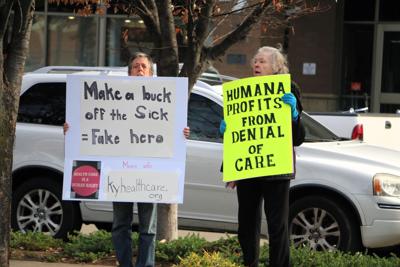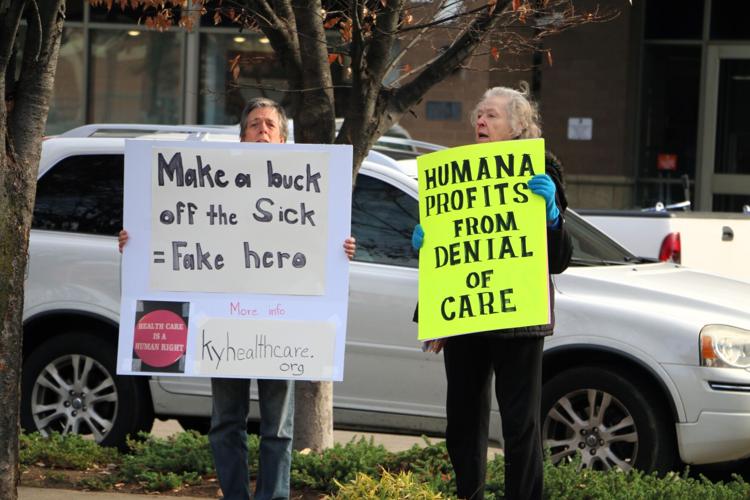LOUISVILLE, Ky. (WDRB) -- Humana Inc., Kentucky's largest publicly traded company, presented a grim outlook for investors on Thursday, saying an "unprecedented" surge in medical costs near the end of 2023 will continue throughout 2024.
The Louisville-based insurer told investors that this year's earnings will come in at only about half of what Wall Street analysts had expected based on Humana's previous forecasts. The company also abandoned the long-term profit target it had pledged to reach in 2025.
Humana's stock price plunged to its lowest level in nearly four years and the outlook even renewed speculation among analysts as to whether the company may once again become an acquisition target for a bigger player such as Cigna.
"We take our commitment seriously and are disappointed we are where we are unable to fully offset these higher cost trends," Humana CEO Bruce Broussard told analysts on a conference call Thursday.
The costs dragging on Humana's bottom line reflect older people using their medical benefits for services such as hospital stays and outpatient surgeries.
Humana gets about 80% of its revenue from Medicare Advantage, a program in which the federal government pays insurers fixed rates to cover medical benefits for those over 65.
Humana and other for-profit insurers benefitted during the pandemic when COVID-19 caused many people to put off medical care.
But now, facing a rebound in medical care, the company slashed its profit expectations for this year and next. While the insurer had previously said it could earn $37 per share in adjusted profits by 2025, its new outlook projects a range of $22 to $26.
Medicare Advantage 'squeeze'
Medicare Advantage is the fastest growing area of health insurance, but for insurers, it's become a more challenging business in recent years, said David Windley, an analyst who follows health insurers for investment bank Jefferies.
Healthcare costs continue to rise, while changes in how the federal government calculates payments to health plans have forced insurers to cut benefits or reduce already thin profit margins, he said.
"The economies of Medicare Advantage are being squeezed to a degree we thought would negatively impact growth," he said in a recent interview ahead of Humana's Thursday announcement.
With Broussard having announced his exit and CEO-in-waiting Jim Rechtin set to take over Humana later this year, Thursday’s move also resets Humana’s self-imposed bar for performance. Like other top-50 corporations, Humana plays a delicate game to manage expectations for profit and revenue growth.
Analysts at investment bank Stephens wondered in a note to clients Thursday whether Humana was “kitchen sink(ing)” its outlook in an effort to be conservative.
The company's downbeat outlook "surprised even the most bearish skeptics," Bank of America Securities analyst Kevin Fischbeck said in a research note. But with a lower bar to leap over, Humana "looks likely to outperform from here," he wrote.
Why it matters – jobs and bonuses
In addition to its disparate investors, Humana’s setback affects its 65,000 employees, the biggest concentration (about 10,000) of whom are in the Louisville metro area.
Since 2018, most of the company’s workers are eligible for annual cash bonuses under the company’s “annual incentive plan,” but the amount of bonuses owed for 2023 was “significantly reduced” because of the company’s performance, Humana said Thursday.
The pressure on Humana’s profit margin also increases its imperative to trim costs, which could lead to job losses.
The last time Humana suffered a setback — when it failed to grow its Medicare ranks as expected for 2022 — the company embarked on “value creation initiatives” meant to wring out costs.
Humana booked nearly $1 billion in charges in 2022 and 2023 for these initiatives, including severance payments for employees whose jobs were eliminated.
On Thursday, Broussard said “ongoing productivity” efforts will be one of the ways the company will work to “quickly restore(s) our margins.”
But how much more can the company cut? Windley, the Jefferies analyst, said in a note to clients on Thursday that Humana’s conservative outlook for 2024 indicates either the company doesn’t “have a lot of fat to cut” or that “they can’t get it out fast enough to affect 20(24).”
Merger target once again?
Then there’s perennial rumor about Humana, which is uniquely concentrated in Medicare, being acquired by a rival who wants a foothold in the fast-growing business. Talks between Humana and commercially focused insurer Cigna reportedly broke down late last year.
The steep decline in Humana’s stock price could “renew (merger) interest” from Cigna, analysts at Stephens said in their note.
Asked in a circumspect way about Humana’s interest in being acquired, Broussard said Thursday that the company’s board will always act in shareholders’ interest. But for now, that seems to mean Humana remaining an independent company, he said on the earnings call.
“We do believe today being a specialty player in the fastest growing part of the industry is the best value for the shareholders,” Broussard said.














